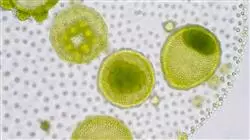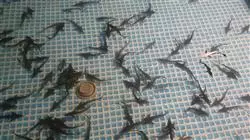University certificate
The world's largest faculty of veterinary medicine”
Introduction to the Program
The increase in population, worldwide, requires new advances in breeding and cultivation systems, to ensure food supply"

Current UN forecasts predict an increase in the world population of around two billion people by 2050. This increase in population will lead to an obligatory development of breeding and cultivation systems that can guarantee food supply to all continents. At the same time, the environmental factor will lead to the appearance of new technologies that will allow this increase in production, while respecting all the parameters of protection of the natural environment.
The Aquaculture sector has been developing and implementing improvements for years, mainly due to the fact that traditional fishing in the usual fishing grounds is not capable of satisfying the current demand for Aquaculture products, as it has to respect closed fishing periods and the catch quotas established by the authorities. These factors have led to a constant development and continuous progress of the aquaculture industry.
This Master's Degree in Aquaculture offers a specific and specialized training, as well as necessary in these times, to be able to face the challenges that arise in the near future. The main objective of this program is to provide the professional of this sector with the necessary tools for a better optimization of resources.
All of the teachers in the program have extensive experience, both at University and high school level, as well as a professional background that qualifies them for the development of the topics in which each one is an expert. This guarantees a teaching team that is up to date with the latest developments in their field, and with the capacity to transmit specialized knowledge.
The training program covers the most important aspects of daily practice in this sector, so that the objective of improving all the parameters that lead to production optimization is within the student's reach. In addition, it brings together the greatest variability of examples and possibilities, so that it reliably approaches the complexity of the sector, which has a wide diversity of production models, making it necessary to have a global vision of the sector.
This Master's Degree provides students with specialized tools and skills to successfully develop their professional activity in the broad environment of aquaculture, working on key competencies such as knowledge of the reality and daily practice of the professional, and developing responsibility in the monitoring and supervision of their work, as well as communication skills within the essential teamwork.
Immerse yourself in this high-quality educational training, which will allow you to face the future challenges of Aquaculture”
This Master's Degree in Aquaculture contains the most complete and up-to-date scientific program on the market. The most important features include:
- Practical cases, presented by experts in Aquaculture
- The graphic, schematic, and eminently practical contents, with which they are created, provide scientific and practical information on the disciplines that are essential for professional practice
- The latest developments in Aquaculture
- Practical exercises where self-assessment can be used to improve learning
- Special emphasis on innovative methodologies in Aquaculture
- Theoretical lessons, questions to the expert, debate forums on controversial topics, and individual reflection work
- Content that is accessible from any, fixed or portable device with an Internet connection
With this intensive program, you will learn which measures are necessary to keep crops safe”
It includes, in its teaching staff, professionals belonging to the veterinary field, who pour into this training the experience of their work, in addition to recognized specialists from reference societies and prestigious universities.
Its multimedia content, elaborated with the latest educational technology, will allow the professional a situated and contextual learning, that is to say, a simulated environment that will provide an immersive specialization, programmed to train in real situations.
The design of this program focuses on problem based learning, by means of which the specialist will have to try to solve the different situations of professional practice, which will be posed throughout the program. For this purpose, the professional will be assisted by an innovative interactive video system, developed by renowned and experienced experts in Aquaculture.
You will examine the causes of alterations of vital physiological elements, with the help of prestigious professionals"

This 100% online Master's Degree will allow you to combine your studies with your professional work, while increasing your knowledge in this field"
Why study at TECH?
TECH is the world’s largest online university. With an impressive catalog of more than 14,000 university programs available in 11 languages, it is positioned as a leader in employability, with a 99% job placement rate. In addition, it relies on an enormous faculty of more than 6,000 professors of the highest international renown.

Study at the world's largest online university and guarantee your professional success. The future starts at TECH”
The world’s best online university according to FORBES
The prestigious Forbes magazine, specialized in business and finance, has highlighted TECH as “the world's best online university” This is what they have recently stated in an article in their digital edition in which they echo the success story of this institution, “thanks to the academic offer it provides, the selection of its teaching staff, and an innovative learning method aimed at educating the professionals of the future”
A revolutionary study method, a cutting-edge faculty and a practical focus: the key to TECH's success.
The most complete study plans on the university scene
TECH offers the most complete study plans on the university scene, with syllabuses that cover fundamental concepts and, at the same time, the main scientific advances in their specific scientific areas. In addition, these programs are continuously being updated to guarantee students the academic vanguard and the most in-demand professional skills. In this way, the university's qualifications provide its graduates with a significant advantage to propel their careers to success.
TECH offers the most comprehensive and intensive study plans on the current university scene.
A world-class teaching staff
TECH's teaching staff is made up of more than 6,000 professors with the highest international recognition. Professors, researchers and top executives of multinational companies, including Isaiah Covington, performance coach of the Boston Celtics; Magda Romanska, principal investigator at Harvard MetaLAB; Ignacio Wistumba, chairman of the department of translational molecular pathology at MD Anderson Cancer Center; and D.W. Pine, creative director of TIME magazine, among others.
Internationally renowned experts, specialized in different branches of Health, Technology, Communication and Business, form part of the TECH faculty.
A unique learning method
TECH is the first university to use Relearning in all its programs. It is the best online learning methodology, accredited with international teaching quality certifications, provided by prestigious educational agencies. In addition, this disruptive educational model is complemented with the “Case Method”, thereby setting up a unique online teaching strategy. Innovative teaching resources are also implemented, including detailed videos, infographics and interactive summaries.
TECH combines Relearning and the Case Method in all its university programs to guarantee excellent theoretical and practical learning, studying whenever and wherever you want.
The world's largest online university
TECH is the world’s largest online university. We are the largest educational institution, with the best and widest online educational catalog, one hundred percent online and covering the vast majority of areas of knowledge. We offer a large selection of our own degrees and accredited online undergraduate and postgraduate degrees. In total, more than 14,000 university degrees, in eleven different languages, make us the largest educational largest in the world.
TECH has the world's most extensive catalog of academic and official programs, available in more than 11 languages.
Google Premier Partner
The American technology giant has awarded TECH the Google Google Premier Partner badge. This award, which is only available to 3% of the world's companies, highlights the efficient, flexible and tailored experience that this university provides to students. The recognition as a Google Premier Partner not only accredits the maximum rigor, performance and investment in TECH's digital infrastructures, but also places this university as one of the world's leading technology companies.
Google has positioned TECH in the top 3% of the world's most important technology companies by awarding it its Google Premier Partner badge.
The official online university of the NBA
TECH is the official online university of the NBA. Thanks to our agreement with the biggest league in basketball, we offer our students exclusive university programs, as well as a wide variety of educational resources focused on the business of the league and other areas of the sports industry. Each program is made up of a uniquely designed syllabus and features exceptional guest hosts: professionals with a distinguished sports background who will offer their expertise on the most relevant topics.
TECH has been selected by the NBA, the world's top basketball league, as its official online university.
The top-rated university by its students
Students have positioned TECH as the world's top-rated university on the main review websites, with a highest rating of 4.9 out of 5, obtained from more than 1,000 reviews. These results consolidate TECH as the benchmark university institution at an international level, reflecting the excellence and positive impact of its educational model.” reflecting the excellence and positive impact of its educational model.”
TECH is the world’s top-rated university by its students.
Leaders in employability
TECH has managed to become the leading university in employability. 99% of its students obtain jobs in the academic field they have studied, within one year of completing any of the university's programs. A similar number achieve immediate career enhancement. All this thanks to a study methodology that bases its effectiveness on the acquisition of practical skills, which are absolutely necessary for professional development.
99% of TECH graduates find a job within a year of completing their studies.
Master's Degree in Aquaculture
The fishing industry produces more than 90 million tons of food annually, but not all of the fish we consume comes from it; between 46% and 52% is raised through aquaculture production, which continues to grow each year. This is where veterinary science plays a crucial role, as it is necessary to supervise and regulate both the quality and integrity of species and their environmental impact. Through the Master’s in Aquaculture offered by TECH Global University, you will be able to carry out this work to the highest curricular standards, with the full security that only our intensive curriculum can provide. We will teach you about types of aquaculture farming, aquaponics, advanced fish physiology, mollusks, crustaceans, algae, raw material selection and nutrition, reproduction, biotechnology, genetics, diseases in aquatic species, and other highly relevant topics. The lessons provide a significant advantage, as they are structured in a 100% online, self-regulated learning format based on advanced academic methodologies. With TECH, fishing for a promising future is just a click away.
Earn an online degree in aquaculture
In just a few decades, the world’s population will reach ten billion, according to various demographic projections. This represents a significant increase in food production. A considerable percentage of animal-based proteins comes from the ocean, which presents two serious problems: first, it would require increasing fishing exploitation, compromising the ecosystem, and second, the fish processing industry would not be able to meet the high demand. Is there a solution? Yes. According to the Seafood Expo Global held in Barcelona, Spain, in April 2022, aquaculture solves both problems. Now you can add it to your resume without leaving your home, receiving guidance from highly qualified faculty and benefiting from cutting-edge graphic and interactive materials that will motivate you to enhance your analytical skills. If you are passionate about aquariums, ponds, and veterinary care for fish, then enroll today and discover why we are the world’s number one online university.







